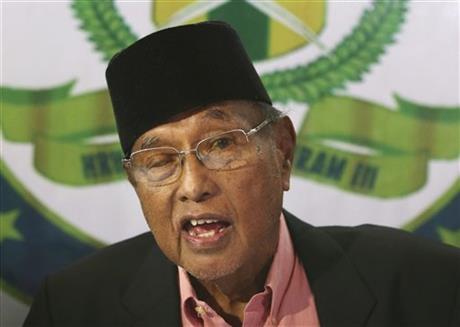
By JIM GOMEZ
FILE – In this Feb. 26, 2013 file photo, Sultan of Sulu Jamalul Kiram III answers questions from reporters at his house in suburban Taguig, south of Manila, Philippines. The Philippine sultan, whose armed followers invaded a vast Malaysian region to revive an old territorial claim and sparked a security crisis in February, has died of multiple organ failure. He was 75. Kiram’s wife Fatima Celia said her husband died in her arms early Sunday, Oct. 20, 2013, at a Philippine hospital. (AP Photo/Aaron Favila, File)
MANILA, Philippines (AP) — A Philippine sultan whose armed followers invaded a vast Malaysian region, sparking a security crisis that left dozens of people dead earlier this year, died Sunday of multiple organ failure. He was 75.
Sultan Jamalul Kiram III’s wife, Fatima Celia, told The Associated Press that her husband died in her arms at a Philippine hospital. She said that before he died, he ordered his family and followers to keep alive the historic territorial claims to Sabah state in neighboring Malaysia.
Although largely forgotten and dismissed as a vestige from a bygone era, Kiram’s Muslim sultanate, based in the southern Philippine province of Sulu, stirred up a security crisis in Malaysia when his younger brother and about 200 followers, dozens of them armed, barged into Sabah’s coastal village of Lahad Datu in February.
Stunned, Malaysia responded by sending in ground troops and launching air strikes. Dozens of people were killed in weeks of sporadic fighting before the standoff eased.
Malaysia has governed the resource-rich frontier region of timberlands and palm oil plantations in northern Borneo as its second-largest federal state since the 1960s.
The Kiram sultanate, which emerged in the 1400s, built a legend for its wide influence at the time and its feared Tausug warriors. Chinese and European leaders once sent vassals to pay homage to their powerful forebears, sultanate spokesman Abraham Idjirani said. The Sulu sultanate preceded both the Philippine republic and Malaysia by centuries.
But overrun by history, the Kirams now carry royal titles and nothing much else.
“I’m the poorest sultan in the world,” an ailing Kiram said in an interview in March at his rundown residence in a Muslim village in Manila, the Philippine capital.
The Kirams claim Sabah has belonged to their sultanate for centuries and was only leased to Malaysia, which they say pays them a paltry annual rent. Malaysian officials contend the payments are part of an arrangement under which the sultanate has ceded the 74,000 square kilometers (28,000 square miles) of Sabah territory to their country.
Philippine presidents have relegated the volatile feud to the backburner despite efforts by the Kirams to put it on the national agenda.
Kiram’s sultanate still has hundreds of followers in Sulu and nearby southern provinces, which are among the Philippines’ poorest and are troubled by Muslim rebels, al-Qaida-linked extremists and outlaws.
Kiram’s family said he would be buried in his hometown of Maimbung in Sulu.
He had eight children with two wives and will likely be replaced by a younger brother, Esmail Kiram II, in a succession often marred in the past by clan infighting and claims by fake descendants of the once-powerful Muslim royalty.



